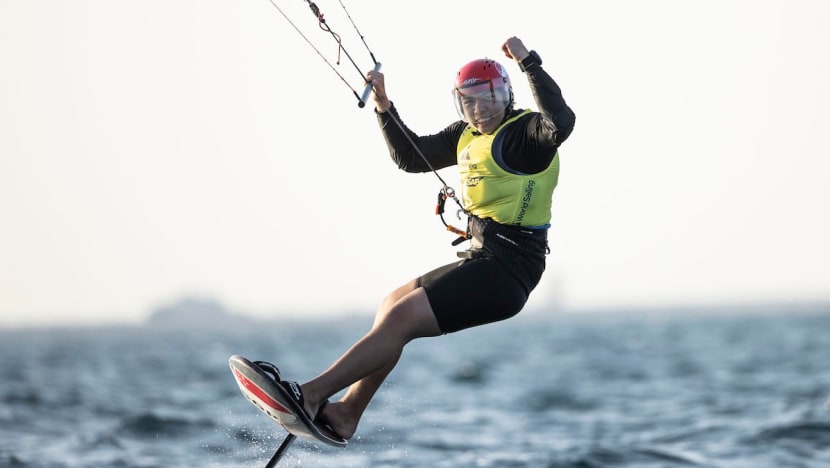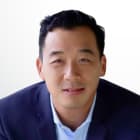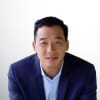Commentary: Kitefoiler Max Maeder’s NS deferment highlights the value all sports can bring to a country
Singapore world champion kitefoiler Maximilian Maeder's NS deferment is significant for a number of reasons, says former NMP and national fencer Nicholas Fang.

Kitefoiler Maximilian Maeder at the 2021 Youth Worlds Formula Kiteboarding. (Photo: Facebook/SingaporeSailing)

This audio is generated by an AI tool.
SINGAPORE: When it was announced on Saturday (Jul 6) that Singapore world champion kitefoiler Maximilian Maeder had been granted a long-term deferment from National Service (NS) for about four years, it was very encouraging and welcome news.
The long-standing tension between the need to serve one’s country as a national serviceman and the demands of the finite sporting career of a high-performance athlete has been present and debated across multiple fora in Singapore for decades.
Whenever the issue is raised, the arguments for the obligation to serve NS to be applied universally, equally and without exception have centered around Singapore’s small population, which means a smaller demographic on which to tap for soldiers, and also the need for a completely fair and egalitarian approach to conscription.
These factors have historically always won out over arguments that national athletes are also doing a form of “national service” each time they fly the flag on the global sporting stage.
To analyse this debate would require a separate commentary of its own. Suffice to say, in Singapore, the need to serve NS regardless of one's medal tally persists to this day, and looks set to continue.
LEANING IN
At the same time, the policymakers at the Ministry of Defence (MINDEF) have clearly been exploring ways to work within the set parameters of NS obligations, while creating optimal conditions for athletes seeking to balance both NS and their sporting aspirations.
These include early enlistment and short postponements of enlistment dates should there be a clash with major competitions.
There are also various provisions to support full-time national servicemen (NSFs) to train for and compete in major events, subject to their NS operational commitments. These allow more flexibility for sportsmen, yet ensure equity with their peers who do not receive these privileges.
They include training leave that does not count towards one’s full-time NS duration and can be taken flexibly according to training and competition needs. This balances sporting pursuits with NS obligations, as the sportsman would have to extend his NS by the duration of his training leave.
But the measure that has historically had the biggest impact is the long-term deferment of NS. Such deferments have been granted very selectively for exceptional sportsmen assessed to be potential medal winners at international competitions like the Olympics and who are able to bring national pride to Singapore.
In the past, this has been extended to six athletes - five swimmers (legendary sprinter Ang Peng Siong, Peter Leong, Sng Ju Wei, Quah Zheng Wen and Singapore’s first Olympic gold medallist Joseph Schooling), and a sailor (coincidentally another Maximilian, in this case Soh).
The addition of Maeder to this list is significant for a number of reasons. First, it is for an athlete competing in a relatively less-established sport. Kitefoiling, which sees riders surf above the surface of the water on hydrofoils with the use of huge kites, is only just making its Olympic debut in Paris this year.
In comparison, swimming is much more established as both an Olympic sport and one that Singaporeans have traditionally excelled in, while Max Soh competed in the Laser class and other events which had long been staples of major games and also happy hunting grounds for Singaporean sailors.
The inclusion of a kitefoiler represents an appreciation of the value that all sports can bring to a country. Maeder’s Asian Games gold and two world championship wins of course make a compelling argument as well.
MINDEF also explained that Maeder’s deferment till the 2028 Olympic Games in Los Angeles is not contingent on his performance in Paris, which would be welcomed by any athlete who understands the vagaries and unpredictable nature of sport in general, and one like sailing in particular which is affected by the vicissitudes of wind, weather and currents, among other factors.
Minister for Culture, Community and Youth Edwin Tong, who oversees sports in Singapore, said: “We always look at the long-term trajectory and development potential of our athletes. In fact, we look at it beyond just the next Olympic cycle. We look to two cycles at least.”
He said that Maeder will now have “the best time and headroom to train (and) to compete, and to look beyond Paris 2024 at what else he can do and how else he can reach his aspirations and peak his performance”.
LISTEN: How to raise an athlete in Singapore
BALANCING ACT
Following the retirement of Schooling earlier this year, Maeder looks set to carry the mantle of Singapore’s next Olympic-calibre world-beater. But as we look to the future, his deferment raises the question of how Singapore will continue to balance between national defence and sporting excellence.
When it comes to conscription, the issue is more focused on fairness and equality, with no one being afforded special treatment. It is not an issue exclusive to Singapore. In other countries with conscription like South Korea, the opportunity to be exempted from military service, by winning an Asian Games or Olympic medal for example, is often the source of unhappiness and division in their society.
This is a scenario that Singapore authorities would be keen to avoid. But how can we continue to maintain the strong public support for NS, while also ensuring long-term growth and the development of high-performance sport in the country?
In my view, there are three things that need to happen to ensure we see progress. First, Singaporean athletes need to continue improving and aiming for results that will enable them to be considered for long-term deferment and the other measures that MINDEF offers to support them during NS. This means performing at major games like the Olympics, Asian Games and other world championship-level competitions.
When there is a critical mass of such athletes across more sports, it would prove that the collaborative approach between MINDEF and the Ministry of Culture, Community and Youth (MCCY) is necessary, and not just benefiting a selected few.
Second, even as MINDEF leans in, it is also beholden of other stakeholders including the athletes themselves, their coaches and support personnel to find the best working solutions during NS, should they not qualify for deferment. This could take the form of greater flexibility when planning training schedules, and efforts to work around an athlete’s NS schedule and commitments.
But perhaps most important is the need to continue defining and refining what it means to be a Sporting Singapore and to have a true sporting culture.
This remains a work in progress, and how it develops will determine how critical policies surrounding NS and sports can become even more symbiotic and synergistic in the years to come.
Nicholas Fang is a former Nominated Member of Parliament. He represented Singapore as a national fencer and triathlete, and previously helmed the fencing and modern pentathlon national federations. He was the Chef de Mission for Team Singapore at the 2015 Southeast Asian Games.











.jpg?itok=JiYztvw8)







